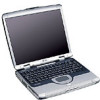Compaq Evo Notebook PC n115 Users Guide Evo Notebook N115 - Page 122
right-click, scanner, screen saver, scroll, Random Access Memory.
 |
View all Compaq Evo Notebook PC n115 manuals
Add to My Manuals
Save this manual to your list of manuals |
Page 122 highlights
Glossary R S RAM Random Access Memory. The main memory of the computer. It holds a copy of the operating system, any programs that are running on the computer, and any data that is being processed. RAM is temporary memory; turning off the computer clears RAM. The more RAM your computer has, the faster the programs respond. See also main memory and ROM. right-click To push down and quickly release the right mouse button to display a shortcut menu of the most commonly used commands for the item you clicked. See also pop-up menu. ROM Read-Only Memory. Memory that contains the basic instructions for the microprocessor. ROM is permanent memory; turning off the computer does not erase it. Since you cannot change or write to ROM, it is referred to as read only. See also microprocessor. scanner A device that creates digital images of printed documents and photographs. Software allows you to save and edit the images on the computer. See also digital and software. screen saver A moving picture or pattern that displays on the screen when you stop using your computer for a specified period of time. Originally designed to protect the monitor, screen savers are now used for amusement. scroll To gradually move information across the screen when a document or Web page is too long or too wide to view all at once. Scroll bars are located along the right side and across the bottom of a window. When scroll arrows are present at the ends of the bars, you know that some information is off the screen. Click on one of the arrows to scroll the information into view. 16 Users Guide















